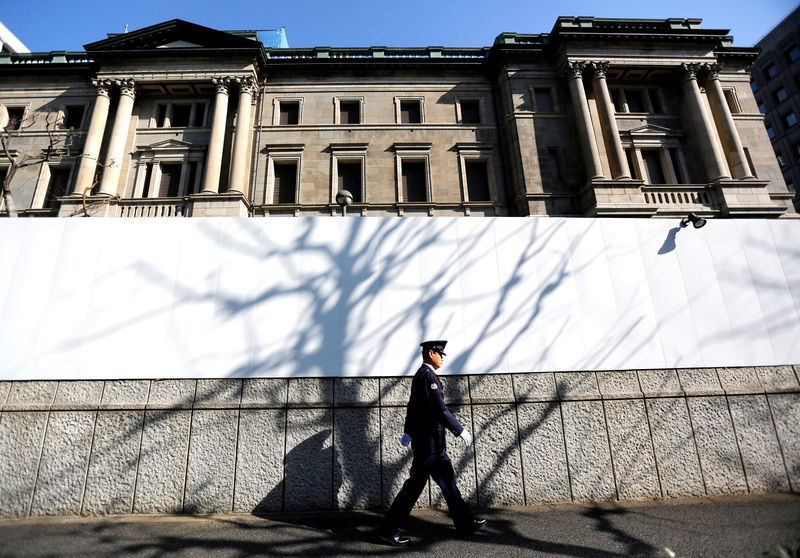By Kaori Kaneko
TOKYO (Reuters) - The Bank of Japan is laying the groundwork for deepening negative interest rates, analysts polled by Reuters said, with two-thirds of respondents expecting the central bank to loosen monetary policy this month.
Risks to the global economy have risen from a protracted Sino-U.S. trade war and Brexit, among other factors, and Japan's central bank is not alone in having to consider launching more stimulus to avert a sharp slowdown.
At its rate review last month, the BOJ said it would take a more thorough look at whether heightening overseas risks could derail Japan's fragile economic recovery.
BOJ Governor Haruhiko Kuroda has said the central bank is edging closer to expanding stimulus as the trade war and slowing global demand cloud Japan's economic outlook.
In a Reuters poll conducted between Oct. 2-14, 35 of 41 economists said the central bank's next move would be to ease policy, while six predicted it would cut back on monetary support. Most economists responded to the survey before U.S. President Donald Trump outlined the first phase of an agreement to end a trade war with China last week.
Of those who projected monetary easing, 21 said it would happen at its Oct. 30-31 meeting, five predicted action in December and another six said next year or later. The remainder did not give a time frame for when the BOJ would ease.
"Judging from the governor's comments, the BOJ appears to be considering the option of cutting short-term interest rates while preventing the yield curve from flattening too much," said Harumi Taguchi, principal economist at IHS Markit.
Under a policy dubbed yield curve control (YCC), the BOJ pledges to guide short-term rates at -0.1% and the 10-year government bond yield around 0%. It also buys government bonds and risky assets to flood the economy with cash.
Critics say cutting the -0.1% short-term rate target further would do more harm than good to the economy as it would strain financial institutions' already narrowing profit margins and discourage them from boosting lending.
Still, 28 of 37 economists said the BOJ had already started laying the groundwork for deepening negative rates. Governor Kuroda had said the move was among options the central bank would consider if it was to ease policy.
The number of analysts who predicted the BOJ might opt for a deepening of negative rates rose to 15 in the October poll, nearly doubling from eight in September.
On other possible tools the BOJ could use, 17 said the central bank would tweak its forward guidance pledging to keep interest rates at current ultra-low levels at least until spring of next year, the poll showed.
A majority of economists polled said that if the BOJ was to deepen negative rates, it would accompany the step with measures to ease the subsequent side-effects.
"Without steps to mitigate the side-effects, some commercial banks may face a profit squeeze and see their stock prices fall sharply," said Hiroshi Ugai, chief economist at JPMorgan (NYSE:JPM) Securities Japan.
"If that happens, it could prompt investors to shy away from risk and affect currency rates. That would undermine the effect of any BOJ easing."
When asked what tools could be used to soften the blow on banks, 60% of those polled said the BOJ would tweak its tiered-system on reserves to increase the portion for which a 0.1% interest rate is offered to financial institutions.
Seven projected the central bank would cut interest rates on its loan support program and three said the BOJ would do both, cut interest rates and raise the amount of loan under the program, the poll showed.
The poll also showed analysts expected Japan's economy to shrink an annualized 2.6% in the current quarter due to the hit from a sales tax hike that took effect in October.
The economy is likely to grow 0.7% in the fiscal year ending in March 2020 and 0.4% the following year, the poll showed.
Japan rolled out a twice-delayed increase in the sales tax to 10% from 8% on Oct. 1, a move seen critical for fixing the country's tattered finances but risks hurting consumption and tipping the economy into recession.
The core consumer price index, which includes oil products but excludes fresh food prices, would rise 0.7% in the current fiscal year to March 2020 and 0.6% in the following fiscal year, the poll showed.

Prime Minister Shinzo Abe has vowed to take "all possible steps" if risks to the economy mount, echoing a pledge made by the central bank and signaling the prospect of fiscal stimulus in case this month's sales tax increase triggers a sharp economic downturn.
(Polling and reporting by Kaori Kaneko; Additional polling by Khushboo Mittal and Anisha Sheth in BENGALURU; Editing by Leika Kihara and Jacqueline Wong)